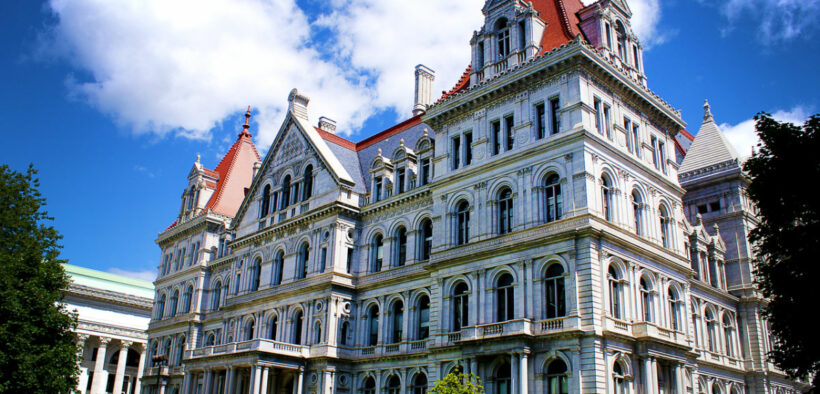The NY Adult Sexual Abuse Survivors ‘Claim Revival’ Window Ended on Thanksgiving
Adult Survivors Act resulted in 2500 lawsuits

Shielagh Clark was abused by her pastor from age 15 through 20. She says he would take her into his private office under the guise of counseling, and there engage in inappropriate contact with her. He told her this is what she was made for and that she was “helping him better perform his ministry.” Eventually, the conduct led to rape.

Clark is a victim whose claim has been revived under New York’s Adult Survivors Act, a law that opened a window for adult sexual abuse victims to file lawsuits in cases that were otherwise barred by the statute of limitations. It expired on Thanksgiving Day, November 23.
It has been used to sue some high profile defendants, like former President Donald Trump and Bill Cosby. It also opened the door for survivors to sue public entities. A large portion of the over 2,500 lawsuits filed under the Act were filed against the state and local governments for allegations of abuse at state prisons and local jail systems.
Safe Horizon CEO Liz Roberts commended the Adult Survivors Act as “a monumental victory for survivors whose courage and commitment resulted in a viable path to justice and healing for thousands.” Safe Horizon is an advocacy group that supports victims of crime and abuse.
Because of their trauma, sexual abuse survivors often delay reporting the conduct for years. In the case of child sex abuse, the average age at the time of reporting is about 52 years, Briggham Winkler, general editor for the Evangelical Council for Abuse Prevention (ECAP), told MinistryWatch. He added that most survivors probably never disclose the abuse they suffer.
At least one of the suits filed under New York’s Adult Survivors Act was filed against a church. Clark filed suit in January against Hyde Park Baptist Church in Dutchess County, New York.
The lawsuit alleges the church was negligent and failed to exercise a reasonable standard of care in ensuring a “safe and suitable [c]hurch environment” wherein church members were protected from “potential predatory acts perpetrated by its employees.”
It also includes a claim that the church was negligent in hiring and retaining the perpetrator.
Clark, who also filed suit as a child survivor under that New York law, claimed she was assaulted by her former pastor Jonathan Weaver from 2000 until 2005.
Access to MinistryWatch content is free. However, we hope you will support our work with your prayers and financial gifts. To make a donation, click here.
At one point, Clark claims Weaver raped her after he traveled to see her at Bob Jones University in South Carolina, under the auspices of recruiting a new associate pastor for the church. The rape resulted in pregnancy. The baby was lost to an intrauterine fetal death.
While Weaver was later convicted for crimes related to his sexual misconduct by South Carolina, Clark alleges that Hyde Park Baptist Church “engaged in a campaign of harassment and discrimination” because of the pregnancy and required her to read a letter of apology to the whole congregation.
The trauma she suffered from the assaults and the treatment she received by the church sent Clark into depression and she became suicidal, the lawsuit reads.
Clark is seeking compensatory and punitive damages from the defendant.
Attorney Boz Tchividjian is representing Clark in the lawsuit against Hyde Park Baptist Church. While Tchividjian supports the “look back window” provided by the expired act, he would eliminate statutes of limitations in sexual abuse cases altogether.
“I’m not really a fan of statutes of limitations to begin with because they are arbitrary and a result of political negotiations,” he told MinistryWatch.
If a case is really old, it will have enough challenges, like lack of evidence or difficulty finding witnesses, without being barred by the statute of limitations, Tchividjian said. He thinks the justice system should vet these cases.
Winkler agrees with Tchividjian about the needed statute of limitations reforms. “The argument against these reforms is weak, in my opinion. I understand the apparent issues related to due process, but I think that’s for the courts to decide, as they say, on each individual case. These reforms allow investigators and the authorities the opportunity to look for evidence of sexual abuse and respond accordingly,” he told MinistryWatch.
States other than New York have been enacting statutes of limitations reforms and opening windows for survivors to file civil actions. According to ChildUSA, 21 U.S. jurisdictions have enacted some kind of civil statute of limitations reform.
California passed a law similar to New York’s in October 2022. The Sexual Abuse and Cover Up Accountability Act allows claims based on a sexual assault that occurred on or after January 1, 2009, to be revived and filed until December 31, 2026, if they would otherwise be barred solely because the statute of limitations had expired. The current statute of limitations in California is 10 years.
This spring, Arkansas passed a law opening a two-year claim revival window for victims with disabilities.



